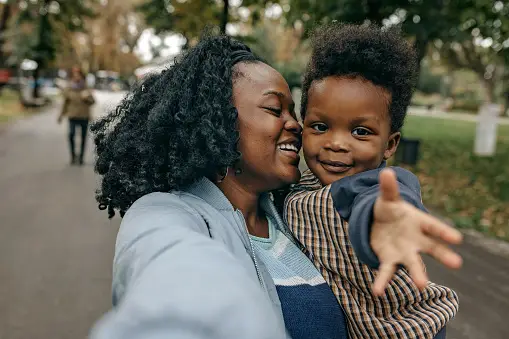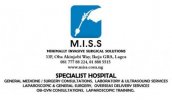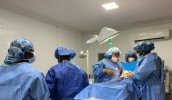Cleft lip, also known as orofacial clefts, is one of the most common congenital craniofacial deformities. It occurs when the tissues that make up the upper lip do not join properly during early fetal development. It is a physical split on two sides of the upper lip that sometimes starts from a small notch to a complete lip separation with an opening in the roof of the mouth.
This cleft lip can cause difficulties with feeding and speech, sometimes a hearing deficit and equally distorts the facial structures. This article will explore the causes, prevention, and treatment of cleft lip in Nigeria and the costs and criteria associated with surgery.
Causes of cleft lips in babies
While the causes of cleft lips and palate are not fully understood as there is no definite cause, most researchers believe that a combination of genetic and environmental factors in many cases causes cleft lip. Some of the risk factors include;
- A family history of cleft lips (Gene mutation).
- Exposure to German measles (Rubella) or other infections.
- Use of certain medications like anti-seizure medications.
- Diabetics and obesity.
- Alcohol and Toxins from cigarette smoking or tobacco.
- Vitamin deficiencies, especially during early pregnancy, e.g., Folic acid.
The cleft lip and cleft palate incidence is higher in males than females. The reason is not fully understood, but it may have something to do with differences in hormone levels between the sexes. Also, parents who are older than usual at the time of birth of their baby are at higher risk of having children with cleft lip.
Prevention of cleft lips in babies during pregnancy
Although there is no guaranteed way to prevent cleft lip, there are some steps that pregnant women can take to reduce the chances:
- Regular preconception and prenatal care.
- Genetic counseling.
- Ultrasound scans to detect in time.
- Prenatal multivitamins. Such vitamins include ingesting folic acid and supplements of at least 400 micrograms daily.
- Sensitization on possible environmental dangers like smoking and drinking alcohol during pregnancy.
- Maintaining a nutritious diet and a healthy weight.
When is the best age for cleft lip surgery in Nigeria?
Timely surgical repair by an experienced team of orofacial cleft specialists can help remedy a baby with cleft lips. The surgery aims to correct the physical defect and restore the function of the lip and mouth.
It is usually best to perform cleft lip surgery within the first few months of life, from 3 to 6 months old. At this age, the tissues are still flexible and easy to repair. The baby’s skull and face must have been fully formed and can take anesthesia. However, note that the exact timing of the surgery depends on the child’s condition and development.
How much does cleft lip surgery cost in Nigeria?
The cost of cleft lip surgery in Nigeria can vary among hospitals and surgeons and the case's complexity. The average cost in Nigeria ranges from N150,000 to N500,000.
How long will a baby heal from cleft lip surgery?
The incision usually takes about 3 to 4 weeks to heal; note that each child’s healing process differs. Some children can take a longer time to heal. It is pertinent to adhere to the surgeon’s directives regarding taking care of the incision.
What are the criteria for cleft lip surgery in Nigeria?
In Nigeria, there are several criteria a child must meet to be eligible for cleft lip surgery. These criteria may vary slightly between hospitals. They are;
- The child must fall between the ages of 3 and 6 months old.
- The cleft lip must be affecting only one side of the lip or affecting both sides of the lip.
- The child must be healthy and free from other severe craniofacial anomalies or medical conditions.
How to care for your baby after cleft lip surgery
- Nutrition and hydration are essential to healing. Frequent, smaller feedings are necessary for rapid healing. Give soft, pureed or mashed foods for at least 3 weeks.
- Keep your baby hydrated.
- Ensure that the incision site is always clean and dry.
- Take care not to bump your child's lip, as the area remains fragile.
Can I breastfeed my baby after cleft lip surgery?
Yes, it is possible to breastfeed your baby after cleft lip surgery, but it may take some time and effort. You may have to devise a different technique in breastfeeding from the initial position before surgery. Your surgeon or nurse will show you how to hold your baby to promote successful breastfeeding.
Good prenatal care is one of the best ways to increase the chances of giving birth to a healthy baby. Some doctors and scientists believe the rise in cleft lips is caused mainly by the inadequate prenatal care of many pregnant women, as some of this damage occurs at the very first stage of the baby’s development. Eat healthy and avoid consuming harmful substances.
Frequently Asked Questions (FAQs)
- How much does cleft lip surgery cost in Nigeria?
Cleft lip surgery falls between N150,000 to N500,000.
- How can I prevent my baby from having a cleft lip during pregnancy?
There is no guaranteed way to prevent cleft lips, but sufficient ingestion of Vitamins B and other supplements may be helpful.
- Can I breastfeed my baby after a cleft lip surgery?
You can breastfeed your baby after cleft lip surgery.










Comments